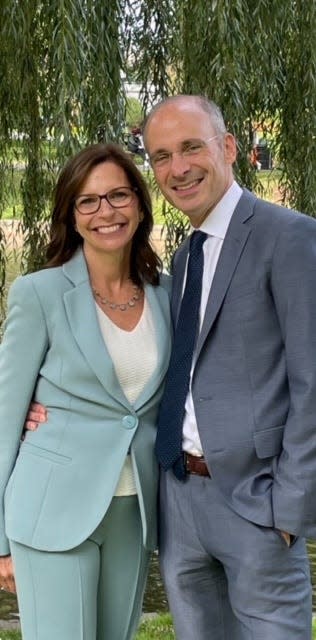We welcomed refugees into our home. Now Texas wants to stop us supporting anyone else.
Eight years ago, when a growing conflict in Syria forced millions of people from their homes, our synagogue called on our community to respond. That is how our very average family came to do something that changed our lives forever: We were able to open our home to a refugee family seeking safety in the United States.
Over the next year we, along with a large team of friends and volunteers, supported them to navigate their new life by connecting the parents to employment opportunities, facilitating enrolling their children in school and helping out with bureaucratic paperwork. Rather than suffer indefinitely in an open-air camp, the family thrived with the chance to start anew in our nation.
Our ability to welcome this family offered them a chance to heal from the trauma of losing their home in Syria, but it also gave new meaning to our own lives.
Israel, Hamas need more than 'pause': Army veterans like me know that 'war is hell.' We must push for a cease-fire in Gaza.
Our family – and nation – wouldn't exist without immigrants, refugees
We have always known that our life together would have not been possible if Peter’s grandfather had not received a similar welcome when he fled to the United States during World War II. But the experience of being the welcomers ourselves left us with a gratitude we could have never anticipated. Being parole sponsors has deepened both our faith and our patriotism.
To date, we have welcomed more than seven families and individuals from Syria, Afghanistan and, most recently, Ukraine through humanitarian parole programs.
The more than 70-year-old parole authority was created after World War II to allow more people like Peter’s grandfather to seek safety in the United States for a certain period of time.
In response to global crises, the Biden administration created the Uniting for Ukraine (U4U) parole program and in response to its success, used that as a model to create similar programs for Cubans, Haitians, Nicaraguans and Venezuelans (CHNV) announced back in January.
The programs have received enthusiastic support, with more than 1.5 million Americans applying to sponsor friends, family members and other global neighbors from these four countries.
Since the programs are so similar, we were baffled to learn that Texas and 20 other states sued the federal government in an effort to specifically block the CHNV humanitarian parole programs.
We have experienced firsthand and many times over the immeasurable benefits that parole programs offer to sponsors and beneficiaries alike. If anything, humanitarian sponsorship should be further expanded to afford more Americans the freedom to welcome.
New Texas border policy: If Greg Abbott gets his way, dogcatchers will be able to detain suspected migrants in Texas
The freedom to welcome is deeply American
Sometimes Americans sponsor a member of their own family, but often people become sponsors like we did – through their churches, synagogues and local nonprofits across the country who are driven by their faith and values to help a global neighbor.
The two of us were able to do this amazing work because our friends and loved ones came together to help us welcome the people we sponsored. We and other volunteers were able to connect our beneficiaries to every local resource they need to thrive in our communities, from signing up for English language classes to driving them to a doctor’s appointment.
Opinion alerts: Get columns from your favorite columnists + expert analysis on top issues, delivered straight to your device through the USA TODAY app. Don't have the app? Download it for free from your app store.
We have found that the support we provide as sponsors quickly helps the families we welcome to help themselves and contribute to their new communities. Take for example, the teenager whom we welcomed years ago – she is now planning to enter nursing school, eager to do her part to solve our nation’s shortage of health professionals after the pandemic.
We have no doubt that there are countless families from Cuba, Haiti, Nicaragua and Venezuela who would do the same, if given the opportunity.
An impending federal district court ruling in Texas v. DHS will decide the fate of the CHNV program. But the popularity and success of these programs say it all.
The freedom to welcome is deeply American and should be protected, as it allows us to fulfill our fundamental values of liberty and opportunity.

Lisa and Peter Weinstock live in Massachusetts, where they work in health care and education.
You can read diverse opinions from our Board of Contributors and other writers on the Opinion front page, on Twitter @usatodayopinion and in our daily Opinion newsletter.
This article originally appeared on USA TODAY: Texas wants to stop us from welcoming refugees into our homes
